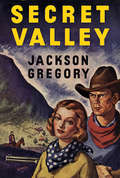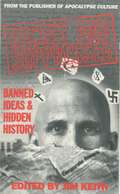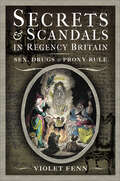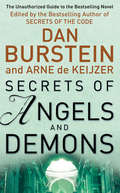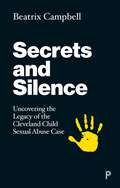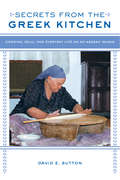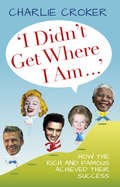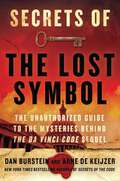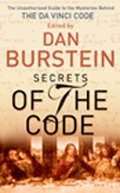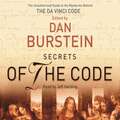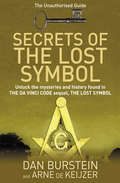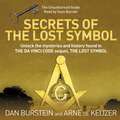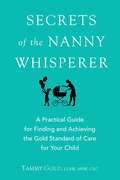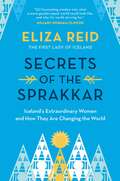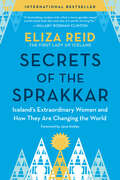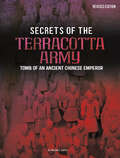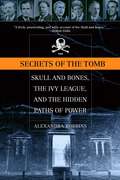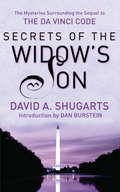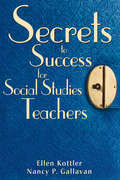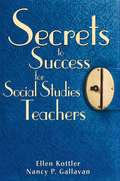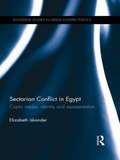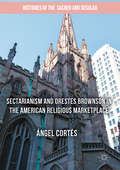- Table View
- List View
Secret Valley
by Jackson GregorySecret Valley, first published in 1939, is a classic old west novel of action, adventure and romance by Jackson Gregory (1882-1943), author of more than 40 western and detective novels. From the dust-jacket: Ross Haveril was the last of a clan of hard-fighting, quick-tempered men. Now, after years of prospecting in South America, he was returning to his home in Secret Valley. But Haveril didn’t reckon on the changes that time brings. This was the West of lawless days, and things happened suddenly and without warning. That’s why he didn’t have much time to think when he faced his bitterest enemy, Tom Storm, in command of the valley. First he had to save his home and avenge Bob Roberts, who had died helping him. Then there was a gambler’s beautiful daughter who was certainly worth fighting for, if anything is. Only Jackson Gregory could spin a yarn as lyric and breathless as Secret Valley. It’s a lively tale of romance, of whirling action and flying bullets, written with an intimate knowledge of the West and its people.
Secret and Suppressed
by Jim KeithAn underground sensation, Secret and Suppressed confronts the reader with disquieting revelations on mind control, secret societies, media disinformation, cults and elite cabals.
Secrets & Scandals in Regency Britain: Sex, Drugs & Proxy Rule
by Violet FennThis book takes an entertaining peek at the secrets and scandals of Regency Britain, a period in which the heir to the throne was making merry with his mistress whilst his ailing father attempted to keep a grip on both his crown and his finances. From Princess Caraboo to the Peterloo Massacre, the Regency was a period of immense upheaval in both personal and public lives as well as in politics. We’ll see how the advent of the modern media brought ‘spin’ to scandal and focus on stories of those people and events who encapsulated the age.
Secrets Of Angels And Demons
by Dan Burstein Arne de KeijzerThe first book to help you understand the mysteries and secret histories within the plot of Dan Brown's bestselling ANGELS AND DEMONS.SECRETS OF ANGELS AND DEMONS provides the curious reader with concise, authoritative explorations of the major themes that help propel the plot of Dan Brown's new bestseller, ANGELS AND DEMONS. Taking the same detailed approach as SECRETS OF THE CODE, Burstein and de Keijzer examine the provocative issues raised in the novel: the existence and scope of the Illuminati and their relationship to other 'secret societies'; the ongoing, centuries-old debate between science and religion; the history and practices of the Vatican and pagan symbolism and its place within the Church. They also explore the world of Bernini, master artist of the Baroque era, and the secret meanings behind his symbolism; what really happened in the trial of Galileo; and the real state-of-the-art of anti-matter technology. This book will delight and engage everyone who finished ANGELS AND DEMONS thinking, 'I need to know more about this book'.
Secrets and Silence: Uncovering the Legacy of the Cleveland Child Sexual Abuse Case
by Beatrix CampbellThe child sexual abuse scandal in the English county of Cleveland in the 1980s was a defining moment but not the scandal we were led to believe it was. Acclaimed journalist Beatrix Campbell has uncovered government documents that show how medical evidence of childhood rape identified by pioneering paediatricians was deemed credible but ‘dangerous’ – it was more important to save money than save children. This book reveals how this secret has framed policy making and public opinion and the consequences it has had for children, professionals, justice and the state. The deaths of ‘national treasures’ Sir Jimmy Savile and Sir Cyril Smith led to a torrent of evidence of childhood suffering, the discovery of widespread sexual exploitation and institutional abuse across the world – all in plain sight. The Cleveland children have remained in the shadows. Now, for the first time, a Cleveland child delves into her records and shares her story.
Secrets from the Greek Kitchen
by David E. SuttonSecrets from the Greek Kitchen explores how cooking skills, practices, and knowledge on the island of Kalymnos are reinforced or transformed by contemporary events. Based on more than twenty years of research and the author's videos of everyday cooking techniques, this rich ethnography treats the kitchen as an environment in which people pursue tasks, display expertise, and confront culturally defined risks. Kalymnian islanders, both women and men, use food as a way of evoking personal and collective memory, creating an elaborate discourse on ingredients, tastes, and recipes. Author David E. Sutton focuses on micropractices in the kitchen, such as the cutting of onions, the use of a can opener, and the rolling of phyllo dough, along with cultural changes, such as the rise of televised cooking shows, to reveal new perspectives on the anthropology of everyday living.
Secrets of Success: The Quirks and Superstitions of the Rich and Famous
by Charlie CrokerDid you know that Beethoven made every cup of coffee with exactly 60 beans?Or that Shirley Temple always had precisely 56 curls in her hair?Or that the young Frank Sinatra practised underwater swimming as a way of developing his ability to hold long breaths?In Secrets of Success, Charlie Croker brings his proven blend of gripping trivia and incisive humour to the question of how famous high achievers reached those heights. We’ll see Chopin sleeping with wedges between his fingers to increase their span, learn how P.G. Wodehouse reminded himself which pages of a manuscript still needed work, and find out why Thomas Edison chose his research assistants on the basis of their soup-eating habits.This revealing and entertaining book provides countless glimpses into the methods – and sometimes madness – of the world’s most famous figures. From ancient Egypt to the modern day, you’re about to learn the secrets of their success . . .
Secrets of The Lost Symbol: The Unauthorized Guide to the Mysteries Behind The Da Vinci Code Sequel
by Daniel Burstein Arne de Keijzer“If anyone can divine the contents of The Lost Symbol, it’s Dan Burstein.” —New York magazineWith Secrets of the Lost Symbol, co-authors Dan Burstein and Arne de Keijzer delve into the real history, science, and hidden meanings behind Dan Brown’s latest blockbuster novel, The Lost Symbol. As they have done previously with their extraordinary New York Times bestsellers Secrets of the Code and Secrets of Angels & Demons, Burstein and de Keijzer explore the themes, conspiracies, mythologies, codes, encrypted signs, and alternate histories—from the birth of Knights Templar to the present day—popularized by the acclaimed creator of The Da Vinci Code, giving them fresh and fascinating relevance while separating truth from fantasy.
Secrets of Tut's Tomb and the Pyramids
by Stephanie Ann ReiffDiscusses the building of the Egyptian pyramids, strange stories associated with them, and possible powers possessed by pyramids.
Secrets of the Code
by Dan BursteinUnauthorised (but authoritative) guide to the mysteries behind the phenomenal bestseller THE DA VINCI CODEReaders of Dan Brown's extraordinary bestseller THE DA VINCI CODE are fascinated by the questions raised in the novel. Was Jesus actually married to Mary Magdalene? Was she one of his disciples and did she write her own gospel? Did they have a child together? Did some geniuses of art and science, people like Leonardo da Vinci and Isaac Newton, belong to secret societies that had the most compelling insider information in history, and did Leonardo convey some of these ideas in The Last Supper and other paintings? SECRETS OF THE CODE is the definitive guide to the novel and provides the curious reader with authoritative explorations into the major themes within THE DA VINCI CODE.
Secrets of the Code
by Dan BursteinReaders of Dan Brown's extraordinary bestseller THE DA VINCI CODE are fascinated by the questions raised in the novel. Was Jesus actually married to Mary Magdalene? Was she one of his disciples and did she write her own gospel? Did they have a child together? Did some geniuses of art and science, people like Leonardo da Vinci and Isaac Newton, belong to secret societies that had the most compelling insider information in history, and did Leonardo convey some of these ideas in The Last Supper and other paintings? SECRETS OF THE CODE is the definitive guide to the novel and provides the curious reader with authoritative explorations into the major themes within THE DA VINCI CODE.Read by Sian Thomas and Jeff Harding(p) 2005 Orion Publishing Group
Secrets of the Homefront Girls
by Kate ThompsonA new series from bestselling author Kate Thompson.'Kate Thompson's wartime novels always strike a chord and Secrets of the Homefront Girls is no exception. You can almost smell the Yardley violets drifting over the factory as the girls live lives complicated by the trials and tribulations of war' My Weekly'Kate Thompson's put the lives of women working in the Yardley factory during the Blitz at the heart of her latest novel' Woman's HourStratford, 1939.Britain may be at war, but on the home front keeping up morale and keeping up appearances go hand in hand. For the young women working on the lipstick production line at Yardley's cosmetics factory, it's business as usual.Headstrong Renee Gunn is the queen of the lipstick belt - although her cheeky attitude means she's often in trouble. When Esther, an Austrian refugee, arrives at Yardley's, it's Renee who takes her under her wing and teaches her to be a true cockney.But outside of the factory, things are more complicated. Lily, Renee's older sister, has suddenly returned home after six years away, and is hiding a dark secret. Meanwhile Esther is finding life in England more difficult than expected, and it's not long before Renee finds herself in trouble, with nowhere to turn.In the face of the Blitz, the Yardley girls are bound together by friendship and loyalty - but could the secrets they are hiding be the biggest danger of all?'A compelling saga set around the tenacious women of the East End' Daisy Styles'Kate Thompson is a skillful and humane storyteller who lights up the sooty face of the old East End with tales full of drama and human interest.' Annie Murray
Secrets of the Homefront Girls
by Kate ThompsonA new series from bestselling author Kate Thompson.'Kate Thompson's wartime novels always strike a chord and Secrets of the Homefront Girls is no exception. You can almost smell the Yardley violets drifting over the factory as the girls live lives complicated by the trials and tribulations of war' My Weekly'Kate Thompson's put the lives of women working in the Yardley factory during the Blitz at the heart of her latest novel' Woman's HourStratford, 1939.Britain may be at war, but on the home front keeping up morale and keeping up appearances go hand in hand. For the young women working on the lipstick production line at Yardley's cosmetics factory, it's business as usual.Headstrong Renee Gunn is the queen of the lipstick belt - although her cheeky attitude means she's often in trouble. When Esther, an Austrian refugee, arrives at Yardley's, it's Renee who takes her under her wing and teaches her to be a true cockney.But outside of the factory, things are more complicated. Lily, Renee's older sister, has suddenly returned home after six years away, and is hiding a dark secret. Meanwhile Esther is finding life in England more difficult than expected, and it's not long before Renee finds herself in trouble, with nowhere to turn.In the face of the Blitz, the Yardley girls are bound together by friendship and loyalty - but could the secrets they are hiding be the biggest danger of all?'A compelling saga set around the tenacious women of the East End' Daisy Styles'Kate Thompson is a skillful and humane storyteller who lights up the sooty face of the old East End with tales full of drama and human interest.' Annie Murray(P)2019 Hodder & Stoughton Limited
Secrets of the Lost Symbol: The Unauthorised Guide to the Mysteries Behind The Da Vinci Code Sequel
by Sean Barrett Dan Burstein Arne de KeijzerThe first (unauthorised) literary companion to the mysteries behind Dan Brown's latest blockbuster, THE LOST SYMBOL. From the bestselling Secrets team.Delve into a whole new world of secret societies, ancient mysteries, hidden symbols, new-age philosophy and cutting-edge science ... Discover: the role the Freemasons played in US history; the 'real' Katherine Solomon; the true background of the 'Ancient Mysteries'; the reality of Noetic science and much more ...Presenting ideas from world renowned historians, code-breakers, symbologists, theologians, philosophers and scientists, Burstein and de Keijzer break through the web of conspiracies, mythologies, encrypted signs and alternate histories. SECRETS OF THE LOST SYMBOL is a must-read for anyone who wants to separate reality, speculation, fact and fiction in Dan Brown's global phenomenon.
Secrets of the Lost Symbol: The Unauthorised Guide to the Mysteries Behind The Da Vinci Code Sequel
by Sean Barrett Dan Burstein Arne de KeijzerDelve into a whole new world of secret societies, ancient mysteries, hidden symbols, new-age philosophy and cutting-edge science... Discover: the role the Freemasons played in US history; the 'real' Katherine Solomon; the true background of the 'Ancient Mysteries'; the reality of Noetic science and much more...Presenting ideas from world renowned historians, code-breakers, symbologists, theologians, philosophers and scientists, Burstein and de Keijzer break through the web of conspiracies, mythologies, encrypted signs and alternate histories.SECRETS OF THE LOST SYMBOL is a must-read for anyone who wants to separate reality, speculation, fact and fiction in Dan Brown's global phenomenon.Read by Sean Barrett(p) 2010 Orion Publishing Group
Secrets of the Nanny Whisperer
by Tammy GoldThe New Childcare Bible—A Must-Have Whether You Have Occasional Sitters or a Full-Time Nanny Finding the right caregiver can be one of the most life-changing decisions a parent makes. Whether it's a kindly neighbor for the weekday latchkey hours, a teenage babysitter one night a week, or a full-time professional nanny, the right caregiver can enrich a child's world and literally grow her brain. Hire the wrong one, and this person could cause developmental delays and stress for the entire family. In her groundbreaking new book, Secrets of the Nanny Whisperer: A Practical Guide for Finding and Achieving the Gold Standard of Care for Your Child, nationally recognized parenting expert Tammy Gold draws from her extensive background in child developmental psychology, social work, and family therapy to offer the first childcare bible for parents. Knowing the impact caregivers have on children coupled with the unregulated often unknown world of in-home childcare workers, Gold has devoted her professional career, and now this book, to helping parents navigate through this important--and woefully overlooked--process. She arms parents with invaluable tools, tips, and insider secrets to finding the perfect caregiver-family match. Gold's Family Needs Assessment helps parents identify the traits and conditions that are "must-haves," added "pluses," or nonnegotiable "deal breakers. " Parents can then use this list of qualities to quickly weed out unqualified candidates. She also details what to ask over the phone and in a face-to-face interview, how to structure a trial run (which she deems essential), and what to spell out in a Nanny-Family Work Agreement--another essential tool included in the book. Readers learn her "Nanny Speak 1-2-3" technique to help clarify and resolve issues with the caregiver in a productive, positive way. In addition to saving hours and energy, Parents will also discover as much about parenting as they will about finding a nanny. Secrets of the Nanny Whisperer is chock-full of parenting gems about children's developmental stages, ways to nurture and stimulate the child, and essential strategies for maintaining harmonious and high-functioning parent-child-caregiver relationships. This book is a must read for parents who want to create a happier, healthier and safer childcare experience for their child.
Secrets of the Sprakkar: Iceland's Extraordinary Women and How They Are Changing the World
by Eliza ReidThe Canadian first lady of Iceland pens a book about why this tiny nation is leading the charge in gender equality, in the vein of The Moment of Lift.Iceland is the best place on earth to be a woman—but why? For the past twelve years, the World Economic Forum&’s Global Gender Gap Report has ranked Iceland number one on its list of countries closing the gap in equality between men and women. What is it about Iceland that enables its society to make such meaningful progress in this ongoing battle, from electing the world&’s first female president to passing legislation specifically designed to help even the playing field at work and at home? The answer is found in the country&’s sprakkar, an ancient Icelandic word meaning extraordinary or outstanding women. Eliza Reid—Canadian born and raised, and now first lady of Iceland—examines her adopted homeland&’s attitude toward women: the deep-seated cultural sense of fairness, the influence of current and historical role models, and, crucially, the areas where Iceland still has room for improvement. Throughout, she interviews dozens of sprakkar to tell their inspirational stories, and expertly weaves in her own experiences as an immigrant from small-town Canada. The result is an illuminating discussion of what it means to move through the world as a woman and how the rules of society play more of a role in who we view as equal than we may understand. What makes many women&’s experiences there so positive? And what can we learn about fairness to benefit our society? Like influential and progressive first ladies Eleanor Roosevelt, Hillary Rodham Clinton, and Michelle Obama, Reid uses her platform to bring the best of her nation to the world. Secrets of the Sprakkar is a powerful and atmospheric portrait of a tiny country that could lead the way forward for us all.
Secrets of the Sprakkar: Iceland's Extraordinary Women and How They Are Changing the World
by Eliza ReidTHE INTERNATIONAL BESTSELLER!"Secrets of the Sprakkar is a fascinating window into what a more gender-equal world could look like, and why it's worth striving for. Iceland is doing a lot to level the playing field: paid parental leave, affordable childcare, and broad support for gender equality as a core value. Reid takes us on an exploration not only around this fascinating island, but also through the triumphs and stumbles of a country as it journeys towards gender equality."—Hillary Rodham ClintonIceland is the best place on earth to be a woman—but why?For the past twelve years, the World Economic Forum's Global Gender Gap Report has ranked Iceland number one on its list of countries closing the gap in equality between men and women. What is it about Iceland that makes many women's experience there so positive? Why has their society made such meaningful progress in this ongoing battle, from electing the world's first female president to passing legislation specifically designed to help even the playing field at work and at home? And how can we learn from what Icelanders have already discovered about women's powerful place in society and how increased fairness benefits everyone?Eliza Reid, the First Lady of Iceland, examines her adopted homeland's attitude toward women—the deep-seated cultural sense of fairness, the influence of current and historical role models, and, crucially, the areas where Iceland still has room for improvement. Reid's own experience as an immigrant from small-town Canada who never expected to become a first lady is expertly interwoven with interviews with dozens of sprakkar ("extraordinary women") to form the backbone of an illuminating discussion of what it means to move through the world as a woman, and how the rules of society play more of a role in who we view as "equal" than we may understand. Secrets of the Sprakkar is a powerful and atmospheric portrait of a tiny country that could lead the way forward for us all.
Secrets of the Terracotta Army: Tomb of an Ancient Chinese Emperor (Archaeological Mysteries)
by Michael CapekDig through the fields of the far East to unearth the huge clay army of China's first emperor. Why were the thousands of life sized statues built? How were they designed with such intricate detail? Travel along with scientists to find out how the Terracotta Armys discovery sheds light on mysteries from ancient China. Unlocking the secrets of the past is just an artifact away!
Secrets of the Tomb: Skull and Bones, the Ivy League, and the Hidden Paths of Power
by Alexandra RobbinsThe cloak-and-dagger secrecy of Yale University's secret society known as Skull and Bones has prompted people worldwide to attribute to it some of the most staggering conspiracies in modern history. From the society's neaarly windowless crypt in the middle of the Yale campus, the Bonesmen, it is said, plot to dominate the world. In this widely acclaimed book, Alexandra Robbins slips through the veil of myth to reveal the truth about Skull and Bones' operations and influence, and explains why this old-boy 19th century throwback still thrives in 21st-century America.
Secrets of the Widow's Son
by Dan Burstein David A ShugartsA dazzling speculative inquiry into the mysteries surrounding the sequel to THE DA VINCI CODESECRETS OF THE WIDOW'S SON is itself an unprecedented book concept. Relying on extensive investigative reporting and intellectual sleuthing, it is an explorer's field guide to understanding the main themes, ideas, symbols and historical issues which author Dan Brown will most likely utilise in THE SOLOMON KEY - months before this much-awaited sequel to THE DA VINCI CODE is even published.SECRETS OF THE CODE told the story of how the riddle embedded in The Da Vinci Code's dust-cover pointed to Dan Brown's next book: selected letters appearing on the book jacket's flaps, slightly bolder than others, spelled out the mystically alluring question, 'Is There No Help for the Widow's Son?' Research led David Shugarts and his team to understand the role of the 'Widow's Son' in the history of Freemasonry, biblical apocrypha, Mormonism, and various secret societies and occult belief systems. Dan Brown has since confirmed that his next book is indeed about the Masons, and that protagonist Robert Langdon, of DA VINCI CODE and ANGELS AND DEMONS fame, would be back to lead us on a symbolic treasure hunt through the art, architecture and secret codes of the American capital, Washington DC.This book is not a plot spoiler for THE SOLOMON KEY. It is not trying to guess who will be murdered, or which fictional mysteries, cover-ups, and conspiracies will be invented to drive the plot of this story. SECRETS OF THE WIDOW'S SON is about the ideas and issues that will form the background and context for THE SOLOMON KEY.
Secrets to Success for Social Studies Teachers
by Ellen Kottler Nancy P. GallavanProvides novice, preservice, and experienced teachers with guidelines for best practices, social studies standards, and the most practical elements of pedagogy, plus invaluable advice from veteran educators.
Secrets to Success for Social Studies Teachers
by Ellen Kottler Nancy P. GallavanUsing their proven formula for guiding novice, pre-service, and experienced teachers, the authors synthesize real-world insights and the most practical elements of pedagogy to provide a ready-to-use resource of best classroom practices. Based on the authors' experience as teacher educators and skilled social studies teachers, this text helps practitioners: * Make instruction meaningful * Develop literacy to build social studies skills * Incorporate district expectations and state standards * Create a community of learners * Collaborate with colleagues The authors provide easy-to-follow lists, tips, and sample forms and letters to help teachers organize their daily work and reduce stress.
Sectarian Conflict in Egypt: Coptic Media, Identity and Representation (Routledge Studies in Middle Eastern Politics)
by Elizabeth IskanderIn light of the Egyptian uprising in early 2011, understanding the dynamics that are shaping Egyptian politics and society is more crucial than ever as Egypt seeks to re-define itself after the Mubarak era. One of the most controversial debates concerns the place of religion in Egypt’s political future. This book examines the escalation in religious violence in Egypt since 2005 and the public discourses behind it, revealing some of the complex negotiations that lie behind contestations of citizenship, Muslim-Christian relations and national unity. Focusing on Egypt’s largest religious minority group, the Coptic Orthodox Christians, this book explores how national, ethnic and religious expressions of identity are interwoven in the narratives and usage of the press and Internet. In doing so it offers insights into some of Egypt’s contemporary social and political challenges, and recognises the ways that media are involved in constructing and reflecting formations of identity politics. The author examines in depth the processes through which identity and belonging are negotiated via media discourses within the wider framework of changing political realities in Egypt. Using a combination of methodological approaches - including comprehensive surveys and content analysis - the research offers a fresh perspective on the politics of identity in Egypt.
Sectarianism and Orestes Brownson in the American Religious Marketplace
by Ángel CortésThis book reveals the origins of the American religious marketplace by examining the life and work of reformer and journalist Orestes Brownson (1803-1876). Grounded in a wide variety of sources, including personal correspondence, journalistic essays, book reviews, and speeches, this work argues that religious sectarianism profoundly shaped participants in the religious marketplace. Brownson is emblematic of this dynamic because he changed his religious identity seven times over a quarter of a century. Throughout, Brownson waged a war of words opposing religious sectarianism. By the 1840s, however, a corrosive intellectual environment transformed Brownson into an arch religious sectarian. The book ends with a consideration of several explanations for Brownson’s religious mobility, emphasizing the goad of sectarianism as the most salient catalyst for change.
